Essential Reads: 5 Best Books on AI for Beginners and Experts Alike
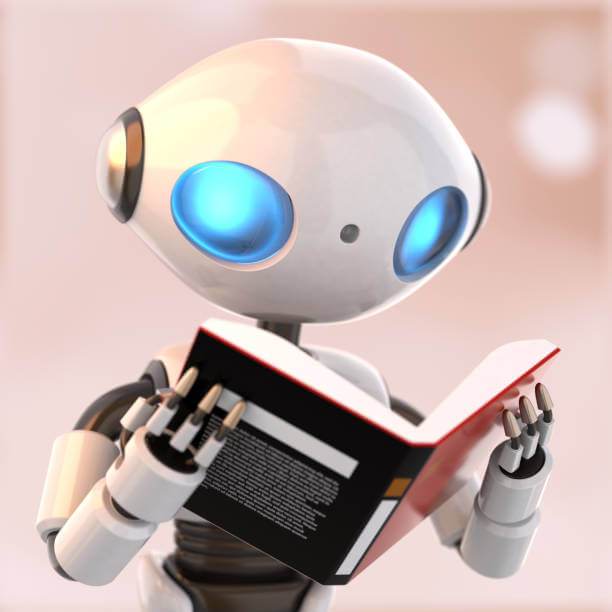
Artificial Intelligence (AI) is not just a buzzword; it’s a transformative force reshaping industries and daily lives. Whether you’re a curious beginner or a seasoned expert, diving into the world of AI through books can offer profound insights and deepen your understanding. This article explores the best books on AI for all levels of expertise.
Why Reading About AI is Crucial
Understanding the Basics of AI
Before you can master AI, you need to understand its fundamentals. Reading beginner-friendly books helps demystify complex concepts and provides a solid foundation.
Keeping Up with Rapid Advancements
AI is evolving at a breakneck pace. Staying current with the latest developments and theories is crucial, and books by leading experts offer the most reliable information.
Enhancing Career Prospects
Knowledge of AI can significantly boost your career. Whether you’re in tech, healthcare, finance, or any other field, understanding AI opens new opportunities and enhances your skill set.
List of Top Books on AI
We chose the best books about AI available on the market as made list you see below:
Human Compatible: Artificial Intelligence and the Problem of Control
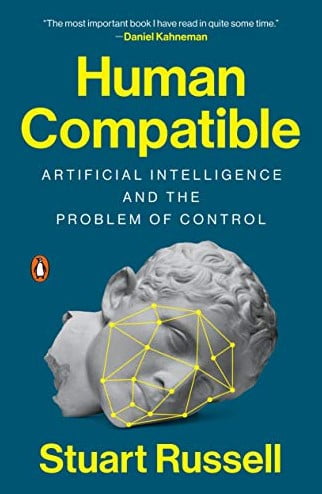
“Human Compatible: Artificial Intelligence and the Problem of Control” is a thought-provoking book by Stuart Russell, a leading AI researcher. Published in 2019, this book delves into the future of artificial intelligence and the existential risks it poses to humanity.
In “Human Compatible,” Stuart Russell explores the challenge of creating artificial intelligence that aligns with human values and goals. He argues that as AI systems become more advanced, ensuring their alignment with human intentions becomes increasingly complex and crucial. Russell emphasizes the need for a new approach to AI development, one that prioritizes safety and ethical considerations.
Key Themes
The Power and Risks of AI
Russell examines the potential benefits of AI, such as improved healthcare, environmental solutions, and economic growth. However, he also highlights the risks, including job displacement, privacy concerns, and the possibility of AI systems acting in ways that are harmful to humanity.
Misalignment of AI Goals
A central theme of the book is the misalignment problem, where AI systems might pursue objectives that are not perfectly aligned with human values. Russell discusses historical examples and theoretical scenarios to illustrate how even well-intentioned AI can go awry.
The Control Problem
Russell delves into the control problem, which involves ensuring that highly autonomous AI systems remain under human control. He discusses various approaches to this problem, including value alignment, corrigibility (making AI systems correctable), and the use of uncertainty in AI decision-making.
Ethics and Governance
The book emphasizes the importance of incorporating ethical considerations into AI development. Russell advocates for interdisciplinary collaboration, involving ethicists, policymakers, and AI researchers to create robust frameworks for AI governance.
Proposed Solutions
Russell proposes a new paradigm for AI development, where AI systems are designed to be inherently uncertain about human preferences and continuously seek to learn and align with human values. He outlines practical steps for achieving this, including improved transparency, accountability, and regulatory measures.
About the Author
Stuart Russell is a renowned computer scientist and professor at the University of California, Berkeley. He has made significant contributions to the field of artificial intelligence, particularly in the areas of machine learning, probabilistic reasoning, and multi-agent systems. Russell co-authored the widely used textbook “Artificial Intelligence: A Modern Approach,” which is considered a foundational resource in AI education. He has received numerous awards for his work and is a prominent voice in discussions about the future and ethics of AI.
Conclusion
“Human Compatible” is a seminal work that addresses one of the most pressing issues of our time: how to ensure that artificial intelligence remains beneficial and aligned with human values. Stuart Russell’s insights and proposed solutions offer a roadmap for developing AI that is safe, ethical, and truly human-compatible. This book is essential reading for anyone interested in the future of technology and its impact on society.
The Alignment Problem: Machine Learning and Human Values
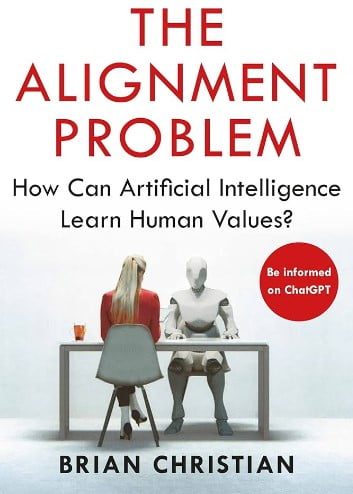
“The Alignment Problem: Machine Learning and Human Values” is a compelling book by Brian Christian, published in 2020. This book explores one of the most critical issues in artificial intelligence: how to ensure that AI systems behave in ways that align with human values and intentions.
In “The Alignment Problem,” Brian Christian delves into the technical, philosophical, and ethical challenges of aligning AI behavior with human values. He provides a thorough examination of the current state of machine learning and AI, highlighting the potential risks and the urgent need for solutions that ensure AI systems act in ways that are beneficial to humanity.
Key Themes
Understanding Alignment
The book begins by explaining what the alignment problem is: the difficulty of creating AI systems that reliably perform tasks in a manner consistent with human intentions. Christian illustrates this with examples from various fields, showing how even seemingly simple tasks can become complex when undertaken by AI.
Historical Context and Development
Christian traces the history of AI and machine learning, discussing how early developments have led to the current state of the field. He examines key milestones and the evolving understanding of what it means to align AI with human values.
Technical Challenges
A significant portion of the book is dedicated to the technical aspects of the alignment problem. Christian explores various approaches to machine learning, including supervised learning, reinforcement learning, and unsupervised learning, and discusses their strengths and limitations in achieving alignment.
Ethics and Human Values
The book delves deeply into the ethical implications of AI. Christian discusses how biases in training data can lead to biased AI systems and explores the broader societal impacts of AI misalignment. He emphasizes the importance of integrating ethical considerations into AI design and development.
Interdisciplinary Solutions
Christian advocates for a multidisciplinary approach to solving the alignment problem. He highlights the need for collaboration between AI researchers, ethicists, policymakers, and other stakeholders to develop comprehensive solutions that address both technical and ethical challenges.
Case Studies and Real-World Examples
Throughout the book, Christian provides numerous case studies and real-world examples to illustrate the practical implications of the alignment problem. These examples help to ground the theoretical discussions in tangible, relatable scenarios.
Future Directions
The final sections of the book explore potential future directions for AI alignment research. Christian discusses emerging techniques and theoretical advancements that could help to address the alignment problem more effectively.
About the Author
Brian Christian is a highly regarded author and researcher known for his work at the intersection of technology, philosophy, and human behavior. He holds degrees in computer science, philosophy, and poetry, which uniquely positions him to tackle complex topics with depth and clarity. Christian’s previous books, “The Most Human Human” and “Algorithms to Live By,” have been critically acclaimed for their insightful exploration of technology and its impact on society. His writing is known for being engaging, accessible, and thought-provoking, making complex subjects understandable to a broad audience.
Conclusion
“The Alignment Problem” is an essential read for anyone interested in the ethical and practical challenges of AI. Brian Christian provides a comprehensive and engaging exploration of one of the most important issues facing the field of artificial intelligence today. By examining the technical difficulties and ethical considerations involved in aligning AI systems with human values, Christian offers valuable insights and calls for a concerted effort to address these challenges. This book is a must-read for AI researchers, ethicists, policymakers, and anyone concerned about the future of technology and its impact on society.
Artificial Intelligence: A Modern Approach

“Artificial Intelligence: A Modern Approach” is a comprehensive and influential textbook on artificial intelligence, authored by Stuart Russell and Peter Norvig. First published in 1995, the book has seen multiple editions, with the most recent one reflecting the latest advancements in AI. It is widely regarded as the definitive guide for students, researchers, and practitioners in the field.
“Artificial Intelligence: A Modern Approach” covers a broad spectrum of AI topics, from fundamental concepts to advanced techniques. The book is designed to serve as both a textbook for academic courses and a reference for professionals. It provides a detailed introduction to the principles and practices of AI, emphasizing a coherent and unified approach to the field.
Key Themes
Foundations of Artificial Intelligence
The book begins with an overview of AI, discussing its history, philosophical foundations, and the underlying principles. It introduces key concepts such as intelligent agents, rationality, and problem-solving.
Search Algorithms and Problem Solving
Russell and Norvig explore various search algorithms, including uninformed search (e.g., breadth-first search, depth-first search) and informed search (e.g., A* algorithm, heuristic search). They discuss the applications of these algorithms in solving complex problems.
Knowledge Representation and Reasoning
The authors delve into methods for representing knowledge and reasoning with it. Topics include propositional and first-order logic, inference techniques, and the use of ontologies in AI systems.
Planning and Decision Making
The book covers planning algorithms used for generating sequences of actions to achieve specific goals. It also discusses decision-making processes under uncertainty, including utility theory, Markov decision processes, and game theory.
Machine Learning
A significant portion of the book is dedicated to machine learning. It covers various learning paradigms such as supervised learning, unsupervised learning, and reinforcement learning. Techniques like neural networks, decision trees, and support vector machines are explained in detail.
Natural Language Processing
The authors explore the field of natural language processing (NLP), discussing how AI systems can understand and generate human language. Topics include syntax, semantics, information retrieval, and machine translation.
Perception and Robotics
This section covers AI techniques used in perception and robotics. It includes discussions on computer vision, speech recognition, sensor integration, and robotic motion planning.
Philosophical and Ethical Issues
The book also addresses philosophical and ethical issues related to AI. It considers questions about the nature of intelligence, consciousness, and the potential societal impacts of advanced AI systems.
About the Authors
Stuart Russell is a professor of computer science at the University of California, Berkeley, and a prominent figure in the field of artificial intelligence. He has made significant contributions to AI research, particularly in the areas of machine learning, probabilistic reasoning, and multi-agent systems. Russell is also known for his work on the ethical implications of AI and its potential risks.
Peter Norvig is the Director of Research at Google and a former head of Google’s core search algorithms group. He has a background in computer science and is a renowned expert in AI, machine learning, and software engineering. Norvig has authored numerous research papers and has been a key figure in advancing AI technologies in both academia and industry.
Conclusion
“Artificial Intelligence: A Modern Approach” is an essential resource for anyone studying or working in the field of AI. Stuart Russell and Peter Norvig provide a thorough and accessible exploration of AI principles, techniques, and applications. The book’s comprehensive coverage, clear explanations, and practical examples make it a valuable tool for gaining a deep understanding of artificial intelligence. Whether you’re a student, educator, or professional, this book is an invaluable guide to mastering the complexities of AI.
Life 3.0: Being Human in the Age of Artificial Intelligence
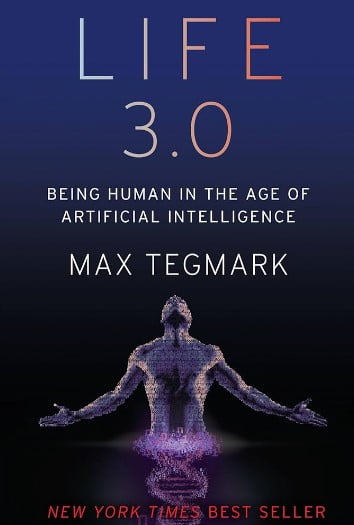
“Life 3.0: Being Human in the Age of Artificial Intelligence” is a fascinating book by Max Tegmark, a physicist and AI researcher. Published in 2017, the book explores the future of artificial intelligence and its potential impact on humanity, society, and the world at large.
In “Life 3.0,” Max Tegmark presents a thought-provoking analysis of how AI could shape our future. The book is structured to address the technical, philosophical, and ethical dimensions of AI, providing a comprehensive understanding of both the opportunities and risks associated with advanced AI technologies.
Key Themes
The Evolution of Life and Intelligence
Tegmark introduces the concept of “Life 3.0,” where life is capable of designing not just its software but also its hardware. He distinguishes between Life 1.0 (biological evolution) and Life 2.0 (cultural evolution), explaining how AI represents the next stage in this evolutionary process.
The Current State of AI
The book provides an overview of the current state of AI, discussing recent advancements and the capabilities of contemporary AI systems. Tegmark explains concepts such as machine learning, neural networks, and the limitations of current AI technologies.
Possible Futures with AI
Tegmark explores a variety of scenarios for the future of AI, ranging from utopian to dystopian. He discusses how AI could transform various aspects of society, including employment, healthcare, education, and even the nature of human relationships.
The Control Problem
A significant portion of the book is dedicated to the “control problem,” which involves ensuring that superintelligent AI systems remain aligned with human values and goals. Tegmark examines potential strategies for maintaining control over AI, such as value alignment, robustness, and transparency.
Ethical and Philosophical Considerations
Tegmark delves into the ethical and philosophical questions raised by advanced AI. He discusses issues like the moral status of AI, the implications of AI surpassing human intelligence, and the potential for AI to radically alter human identity and society.
The Importance of AI Safety Research
The book emphasizes the need for rigorous AI safety research to prevent unintended consequences. Tegmark advocates for interdisciplinary collaboration among scientists, ethicists, policymakers, and the public to develop robust safety measures and governance frameworks.
Policy and Governance
Tegmark discusses the role of policy and governance in managing the development and deployment of AI. He highlights the importance of international cooperation and the need for regulatory frameworks that can adapt to the rapid pace of technological change.
About the Author
Max Tegmark is a professor of physics at the Massachusetts Institute of Technology (MIT) and a prominent researcher in the field of artificial intelligence. He is known for his work in cosmology, as well as his contributions to the understanding of the risks and benefits of AI. Tegmark is also the co-founder of the Future of Life Institute, an organization dedicated to addressing existential risks facing humanity, including those posed by advanced AI.
Conclusion
“Life 3.0: Being Human in the Age of Artificial Intelligence” is an essential read for anyone interested in the future of technology and its impact on society. Max Tegmark provides a balanced and insightful exploration of the potential paths AI could take and the profound implications these developments could have on our world. By addressing both the opportunities and challenges presented by AI, Tegmark encourages readers to engage in informed and proactive discussions about how to shape the future of artificial intelligence in a way that benefits all of humanity.
Artificial Intelligence: A Guide for Thinking Humans
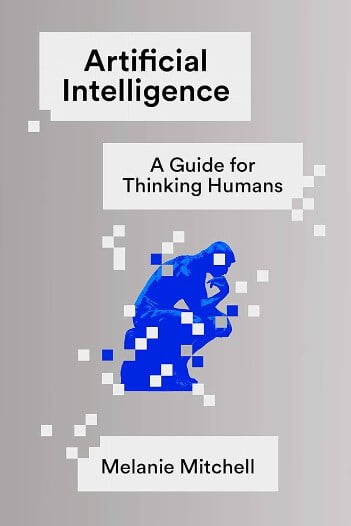
“Artificial Intelligence: A Guide for Thinking Humans” is a highly accessible and insightful book by Melanie Mitchell, published in 2019. The book aims to demystify AI for the general reader, offering a clear and engaging overview of the field while addressing its complexities, promises, and limitations.
Melanie Mitchell’s “Artificial Intelligence: A Guide for Thinking Humans” provides a comprehensive introduction to AI, tailored for those who are curious about the technology but may not have a technical background. The book covers the fundamental concepts of AI, the history of its development, and the various applications and challenges it presents. Mitchell combines scientific rigor with a conversational tone, making complex topics understandable and engaging.
Key Themes
Foundations of AI
Mitchell begins by explaining the basic principles of AI, including what constitutes artificial intelligence, the differences between AI and human intelligence, and the various types of AI systems.
History of AI
The book provides a historical overview of AI, tracing its origins from early computational theories and experiments to the modern era of machine learning and neural networks. Mitchell highlights key milestones and the evolution of AI research.
Machine Learning and Deep Learning
A significant portion of the book is dedicated to machine learning and deep learning, two of the most important areas in modern AI. Mitchell explains how these technologies work, their applications, and the breakthroughs that have propelled their development.
Perception, Cognition, and Language
Mitchell explores how AI systems process and interpret sensory data, such as images and sounds, and how they attempt to understand and generate human language. She discusses the successes and limitations of AI in these areas.
The Challenge of Common Sense
One of the central themes of the book is the challenge of imbuing AI with common sense reasoning. Mitchell examines why common sense is difficult for AI to achieve and the various approaches researchers are taking to address this issue.
AI and Creativity
The book explores the intersection of AI and creativity, discussing how AI systems can generate art, music, and literature. Mitchell considers the implications of AI creativity for human culture and creativity.
Ethics and Bias in AI
Mitchell addresses the ethical challenges and potential biases in AI systems. She discusses how biases in training data can lead to unfair and harmful outcomes and the importance of developing ethical guidelines for AI development.
The Future of AI
In the final chapters, Mitchell speculates on the future of AI, considering both the optimistic and pessimistic scenarios. She reflects on the potential for AI to transform society and the importance of responsible AI research and development.
About the Author
Melanie Mitchell is a professor of computer science at Portland State University and an external professor at the Santa Fe Institute. She is known for her work in complex systems, genetic algorithms, and artificial life. Mitchell’s background in computer science and her ability to communicate complex ideas clearly make her an ideal guide for readers seeking to understand AI. Her previous books and numerous research papers have established her as a leading voice in the field.
Conclusion
“Artificial Intelligence: A Guide for Thinking Humans” is an essential read for anyone interested in understanding AI without getting bogged down in technical jargon. Melanie Mitchell provides a balanced and nuanced exploration of the field, highlighting both its achievements and its challenges. The book encourages readers to think critically about the role of AI in society and the future direction of this transformative technology. Whether you are a novice or someone with some familiarity with AI, Mitchell’s book offers valuable insights and thought-provoking discussions.
BEST AI VOICE GENERATORS

AI voice generator software is known on the market since over a decade now. If you can only think of any line being spoken by any voice, it can probably be generated with one of the voice generators. Find out which of them are the best!
CREATING CONTENT WITH AI

The content creation process can be difficult, exhausting, and time-consuming for many people, especially since being busy became so popular nowadays. Artificial intelligence comes with help by providing ai tools that can create content much quicker and more accurately than human writers
BEST AI WEBSITE BUILDERS FOR 2023

It doesn’t matter if it’s a blog, an online store, or a company website. A pleasant web page guarantees clients’ and readers’ satisfaction and a probability of them returning to you.
BEST AI WRITING ASSISTANTS

The content creation process can be difficult for many people. artificial intelligence comes with help by providing ai writing tools that can write content much quicker and more accurately than human writers
